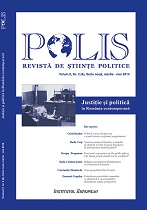Religion and political identification in Communist Romania
Religion and political identification in Communist Romania
Author(s): Rada Cristina IrimieSubject(s): Politics / Political Sciences
Published by: Editura Institutul European
Keywords: communism; Romanian Orthodox Church; national identity; religion; ethnicity
Summary/Abstract: The Orthodox Church has played, from the beginning of the twentieth century, a vital role in building the political architecture of the Romanian state. The establishment of a communist regime in Romania after World War I created a new modus vivendi between Church and State, and placed the Romanian Church’s activities under strict government supervision. This article will look at the role of the religion in the ethnic identity of Romanians, during the communist times. A historical outlook is necessary in understanding the foundation of religion in the Romanian state, thus the article provides a brief background on the role of the Church in the modern Romanian history. Then, the article will examine the unique norms of cooperation between religion and national communism built in Romania, during that period. Subsequently, this will help us observe the interplay between religion and ethnicity evidenced in communist Romania. The cases of the Serbian and the Lipovan Russian communities feature the complexity of this interaction. The goal of this paper is to offer an understanding of the relationship between religious and ethnic identities in Romania, during this particular period.
Journal: Polis. Journal of Political Science
- Issue Year: II/2014
- Issue No: 04
- Page Range: 47-66
- Page Count: 20

